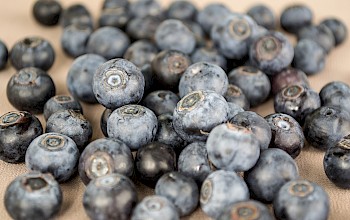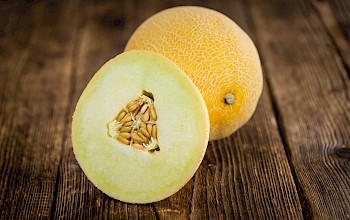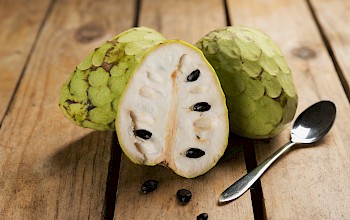Blackcurrant: Calories and Nutrition Analyse
How many calories in blackcurrants?

Nutrition Facts
BlackcurrantsServing size:
handful of blackcurrants (45 g) change
5g10g15g20g30g40g50g60g80g100g120g140g160g180g200g220g250g300g350g400g450g500g600g700g800g900g1000g
1oz2oz3oz4oz5oz6oz7oz8oz10oz12oz15oz20oz25oz30oz35oz40oz50oz
Amount Per Serving:
100g of blackcurrants contain about 63 calories (kcal).
Calories per:
ounce
| handful
| cup
| half cup
| bunch
To give you an idea, a handful of blackcurrants (45 g) contains about 28 calories.
This is about 1% of the daily caloric intake for an average adult with medium weight and activity level (assuming a 2000 kcal daily intake).
Scroll down for details and nutrition tables.
To visualize how much 28 kcal actually is, keep in mind that the calorie content of handful of blackcurrants is similar to that of, for example:
- 0.5 apple
- 1 cube of sugar
Take a quick look at the tables below for detailed information about blackcurrants nutrition.
100g of Blackcurrants
Nutrition
- Calories63
- Carbs Total15.38 g
- Dietary fiber4.3 g
- Fat0.41 g
- Saturated fat0.05 g
- Protein1.4 g
Vitamins
- Vit A230 IU
- Vit B1 (Thiamine)0.05 mg
- Vit B2 (riboflavin)0.05 mg
- Vit B3 (Niacin)0.3 mg
- Vit B50.398 mg
- Vit B60.066 mg
- Vit B9 (Folic acid)8 mcg
- Vit C181 mg
Minerals
- Potassium322 mg
- Phosphorus59 mg
- Magnessium24 mg
- Calcium55 mg
- Sodium2 mg
- Iron1.54 mg
- Zink0.27 mg
When it comes to berries, blackcurrants are often overshadowed by their more popular cousins like strawberries and blueberries. However, these small, tart berries pack a nutritional punch that can't be ignored. Rich in vitamins, minerals, and antioxidants, blackcurrants are a low-calorie, nutrient-dense food that can play a significant role in a healthy diet. Let's dive into the nutritional profile of blackcurrants and discover why they should be a part of your fruit intake.
Blackcurrant Calories and Nutritional Benefits
Blackcurrants are surprisingly low in calories, with just 63 calories per 100 grams, making them an excellent snack for those monitoring their calorie intake. But don't let the low calorie count fool you; these berries are bursting with nutrients.
Carbs in Blackcurrant
Carbohydrates are the primary macronutrient in blackcurrants, with 15.38 grams per 100 grams. However, they are also high in dietary fiber, offering 4.3 grams, which aids in digestion and helps maintain a healthy gut. The glycemic index (GI) of blackcurrants is low (15), making them an excellent choice for people with diabetes or those trying to manage their blood sugar levels.
Protein and Fat in Blackcurrant
While not a significant source of protein, blackcurrants provide 1.4 grams of protein per 100 grams. They are also low in fat, containing just 0.41 grams, with negligible amounts of saturated fat. This makes blackcurrants a heart-healthy addition to any diet.
Vitamins and Minerals in Blackcurrant
Blackcurrants are a powerhouse of vitamins and minerals. They are an exceptional source of Vitamin C, with 181 mg per 100 grams, which is more than three times the recommended daily intake for adults. Vitamin C is crucial for immune system function, skin health, and iron absorption.
They also provide a good amount of Vitamin A (230 IU), essential for vision and immune function, and several B vitamins, including B1, B2, B3, B5, B6, and B9, which are vital for energy production and brain health.
In terms of minerals, blackcurrants offer a wealth of nutrients including calcium (55 mg), iron (1.54 mg), magnesium (24 mg), phosphorus (59 mg), potassium (322 mg), and zinc (0.27 mg). These minerals support bone health, oxygen transport, muscle function, and overall cellular health.
Integrating Blackcurrants into Your Diet
Incorporating blackcurrants into your diet is a delicious way to boost your nutritional intake. They can be enjoyed fresh or used in a variety of recipes, from smoothies and yogurts to jams and desserts. Given their high nutritional value and low calorie count, blackcurrants are an excellent choice for anyone looking to enhance their diet with more fruits.
In conclusion, blackcurrants may be small, but they are mighty in terms of nutrition. With low calories, beneficial fats, and a high content of vitamins and minerals, blackcurrants can contribute significantly to a balanced and healthy diet. So next time you're looking for a nutritious snack or a way to enrich your meals, consider reaching for some blackcurrants.
How many calories are there in 1, 2, 3, or 5 servings of blackcurrants?
- Handful of blackcurrants (45g)28 kcal
- Cup of blackcurrants (170g)107 kcal
- Half cup of blackcurrants (85g)54 kcal
- Blackcurrants bunch (169g)106 kcal
- Ounce (oz) of blackcurrants18 kcal
- Half of medium size servings of blackcurrants14 kcal
- Small size serving of blackcurrants (36g)22.4 kcal
- Big size blackcurrants (59g)36.4 kcal
- Two medium size servings of blackcurrants56 kcal
- Three medium size servings of blackcurrants84 kcal
- Four medium size servings of blackcurrants112 kcal
- Five medium size servings of blackcurrants140 kcal
Compare blackcurrants:
blackcurrants vs blackberry, blackcurrants vs Cranberries, blackcurrants vs raspberry, blackcurrants vs grape, blackcurrants vs gooseberry, blackcurrants vs blueberries, blackcurrants vs raisins, blackcurrants vs cherries, blackcurrants vs orange, blackcurrants vs mulberries, blackcurrants vs strawberry, blackcurrants vs grapefruit, see all compares of blackcurrants.

Similar calories number have:
See also:
Read this:
- How many calories does black lilac have?
- Calories in a half of fig
- Calories in whole fig
- Calories for one, two or more figs
- Calories in handful of figs
- How many carbs (carbohydrates) in Goji berries?
- How much fat in gooseberry?
- How much protein in grape?
- What is weight of grapefruit?
- Guava calories per ounce (oz)
- Jackfruit calories per serving size



Add comment